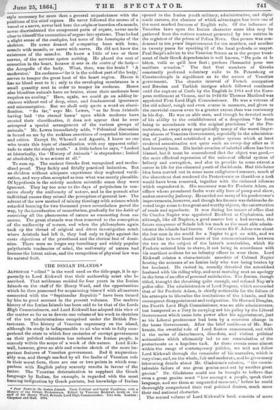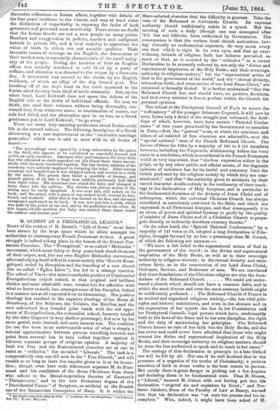THE IONIAN ISLANDS.*
ALTHOUGH " edited " is the word used on the title-page, it is ap- parently to Lord Kirkwall that their authorship must also be ascribed. That nobleman resided for four years in the Ionian Islands on the staff of Sir Henry Ward, and the opportunities which he then possessed for acquainting himse'f with all matters connected with the " Septinsular Republic" have been turned by him to good account in the present volumes. The modern history of the Ionian Islands has been said to be that of the Lords High Commissioners, and Lord Kirkwall has adopted this view of the matter so far as to devote one volume of his work to sketches of the ten administrations comprised under the British Pro- tectorate. The history of Venetian supremacy on the island, although its study is indispensable to all who wish to fully com- prehend the state to which four centuries of corrupt government
• as their political education has reduced the Ionian people, is scarcely within the scope of a work of this nature. Lord Kirk- wall, however, gives an able and concise sketch of the more im- portant features of Venetian government. Bad it unquestion- ably was, and though marked by all the faults of Venetian rule in their worst form, there are one or two points in which com- parison witlt English policy scarcely results in favour of the latter. The Venetian determination to supplant the Greek language by Italian, for example, is regarded with the most burning indignation by Greek patriots, but knowledge of Italian
• Four Fears in the Ionian Islands. Their Political and Social Condition, with History of the British Protectorate. Edited by Viscount Kirkwall, lately on the staff of Sir Henry Ward, Seventh Lord High Commissioner. Two vole. London: Chapman and Hall. 1864. opened to the Ionian youth military, administrative, and diplo- matic careers, the absence of' which advantages has been one of the most marked features of English rule. Of the influence of Venetian laws upon the Ionian character some idea may be gathered from the curious contrast presented by two entries in the registers of the prison of Palma Nova. One person was con- demned to ten years' imprisonment fur ten murders, and another to twenty years for speaking ill of the local podesda or mayor. Paul Sarpi's advice to the Venetian Senate as to the proper treat- ment of their Greek dependencies is well known, "Du pain et le baton, voilti ce leur faut ; gardens l'humanite pour une meillure occasion." The fact that numbers of Greeks constantly preferred voluntary exile to St. Petersburg or Constantinople is significant as to the nature of Venetian government. The chaotic interval of French occupation and Russian and Turkish intrigue which followed continued until the capture of Corfu by the English in 1814 and the Euro- pean settlement at Vienna, and in 1816 Sir Thomas Maitland was appointed First Lord High Commissioner. He was a veteran of the old school, rough and even coarse in manners, and given to the convivial excess even to a greater extent than was customary in his day. He was an able man, and though he devoted much of his ability to the establishment of a despotism "far from being in accordance with the original provisions" of the Pro- tectorate, he swept away energetically many of the worst linger- ing abuses of Venetian Government, especially in the administra- tion of justice, and established a police system which at least rendered assassination not quite such an every-day affair as it had formerly been. His lavish creation of salaried offices has been blamed, but it must be remembered that the object was good,— the more effectual repression of the universal official system of bribery and corruption, and also to provide to some extent a career in life for the educated youth of the islands. Had this latter idea been carried out in some more enlightened manner, much of the discontent that rendered the Protectorate so thankless a task would have been removed, together with the enforced idleness which engendered it. His successor was Sir Frederic Adam, an officer whose prominent faults were silly love of pomp and show, andan unworthy jealousy. Ho carried out many of his predecessor's improvements, however, and though his finance was dubious he de- voted large sums to two great and worthy objects, the construction of roads and aqueducts. It was during his tenure of office that Sir Charles Napier was appointed Resident at Cephalonia, and although, like all Napiers, a good master but a bad servant, the future conqueror of Scinde left his mark as the most able admin- istrator the islands had known. Of course Sir F. Adam was about the last man in the world for a Napier to get on with, and we should like to have heard more of the communications between the two on the subject of the latter's mustachios, which Sir Frederic ordered him to shave, it not being in accordance with his martinet notions for an infantry officer to wear them. Lord Kirkwall relates a characteristic anecdote of Colonel Napier hearing the screams of an Ionian lady who was being beaten by her husband. He rushed in, soundly thrashed the astonished husband with his riding whip, and next morning sent an apology in the form of an offer of personal satisfaction. The Ionian, though titled, thought the thrashing quite enough, and refused Napier's polite offer. The administration of Lord Nugent, which succeeded that of Sir Frederic Adam, is chiefly noticeable for the failure of his attempts to liberalize the institutions of the islands, and his consequent disappointment and resignation. Sir Howard Douglas, the Fourth Lord High Commissioner, was an able administrator, but hampered as a Tory in carrying out his policy by the Liberal Government which came into power after his appointment, just
as his Liberal predecessor had been by a converse change in the home Government. After the brief residence of Mr. Mac- kenzie, the eventful rule of Lord Seaton commenced, and with
it the series. of disturbances, disorders, and violent political animosities which ultimately led to our renunciation of the
protectorate as a hopeless task. As then events come almost within the range of contemporary politics, we will not follow Lord Kirkwall through the remainder of his narrative, which is veryclear, and, on the whole, fair and moderate, and he gives many
interesting details about Mr. Gladstone's mission, " the unmis- takeable failure of one great genius sent out by another great
genius." Mr. Gladstone could not be brought to believe that even a great genius must "live amongst a people, speak their language, and see them at unguarded moments," before he could thoroughly comprehend their real political desires, much more their real national character.
The second volume of Lord Kirkwall's book consists of mere
discursive reflections on Ionian affairs, together with details of his four years residence in the islands, and may at least claim the distinction of impartiality in exposing the faults of both governors and governed most mercilessly. There seems no doubt that the Ionian Greeks are not a nice people on many points.
Bombast and exaggeration in politics, murders and malignant hatreds in private life, and a total inability to appreciate the value of truth in either, are not amiable qualities. Their favourite means of revenge on the Engli-h, the desecration of their tombstones, is especially characteristic of the small malig- nity of the people. During the troubles of 1849 an English officer was actually murdered in cold blood by a party of ruffians, and attention was directed to the corpse by a favourite
dog. A monument was erected to the victim by the English residents, of which an effigy of the dog formed part. The breaking off of the dog's head on the tomb appeared to the Ionian mind the very beau ideal of noble animosity. But, on the other hand, Lord Kirkwall does not spare the defects of the English rule or the faults of individual officials. No one, we think, can read these volumes without being thoroughly con- vinced that, from whatever cause, or combination of causes, our rule bad failed, and the alternative open to us was, as a Greek gentleman put to Lord Kirkwall, "to go away."
There are many very amusing particulars about Ionian social life in the second volume. The following description of a Greek christening is a vast improvement on the " inevitable marriage procession" which one is said to meet with in all books of travel :—
" The proceedings were opened by a long exhortation by the priest to the devil, who appears to be considered as especially present and active on such occasions. Amongst other performances the dirty little boy who officiated as clerk squeaked out the Creed three times succes- sively with the most wonderful rapidity. The last twenty minutes of the ceremony were actively employed in torturing the baby. After various crossings and benedictions it was stripped naked, and carried in a cloth by the nurse. The priests then burnt a quantity of incense, and poured plenty of oil into a large iron caldron, previously half filled with tepid water. His reverence now seized the baby, and plunged it three times into the caldron. The shrieks and piteous moans of the victim may be easily imagined. It was next laid, still naked, on its back; and the priest, with a piece of rag soaked in oil, crossed its face, breast, and stomach. After this it was turned on its face, and the same ceremonies performed on its back. It was now put into a cloth, which was held by the priest at one end, and by the godfather at the other. In this hammock-like position the baby was carried three times round the caldron and incense pan."































 Previous page
Previous page